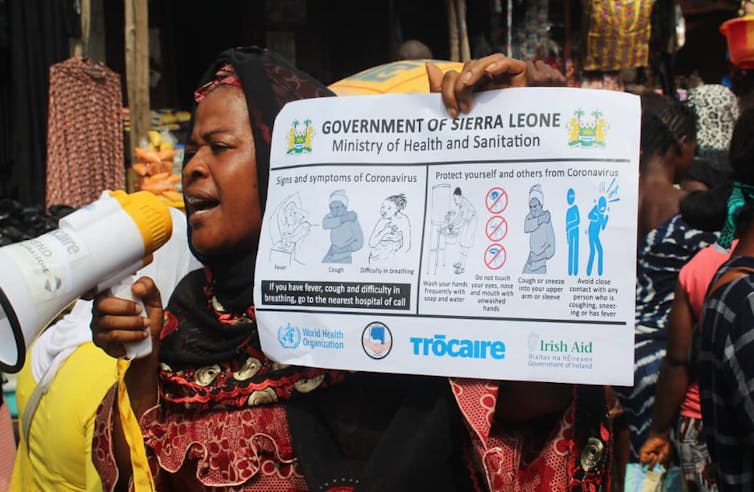
Local coronavirus awareness raising in Funkia Market, Sierra Leone. ,
,
The government of Sierra Leone called a state of emergency on March 25, seven days before the first case of COVID-19 was even confirmed. The virus has spread steadily since then, with as of June 19.
At the same time, the country has begun the rapid countdown to the full onset of the annual rainy season, which raises challenges of its own, especially for the flood-prone local communities in the capital, Freetown. In mid-2019, Freetown and other major Sierra Leonean cities were . Before this, in 2017, more than in the capital.
This year, there has been recognition that more forthright action is required. My colleagues and I are currently working with Sierra Leone’s Department of Disaster Management and Freetown City Council to create disaster preparedness guides for district councillors, disaster managers and local volunteers. The goal is to have several guides and handbooks available by July 2020 across four major cities of Sierra Leone to improve scenario planning if multiple disasters happen at once.
In recent years, there has been a strong focus among those who plan for disasters to build more robust forms of resilience in local communities. Not least in Sierra Leone, where – like most of Africa – disaster management relies heavily on local volunteers and traditional forms of community leadership.
Across Africa, poverty-stricken slums and informal settlements. These are vulnerable to natural hazards such as flooding, suffer from overcrowding, and often lack running water and electricity.
As past experiences of Ebola in west Africa demonstrated, it’s also important to focus on the local communities. Poor handling of pandemics and other natural disasters by national governments and international institutions , inertia and non-compliance among communities and influential community leaders. In the case of the 2014-16 Ebola outbreak, there were many instances where that ultimately delayed responses to the disease and ended up costing further lives.
Today, local communities in Sierra Leone could be confronted with a perfect storm when it comes to preparing for future disasters and events. Better disaster management is an imperative, particularly in the face of three inter-linked challenges.
Coronavirus transmission
First, there is the impact of COVID-19. Community transmission is becoming a stark reality. The situation in both Sierra Leone and elsewhere in Africa remains highly challenging given and the limitation of bringing external humanitarian assistance on the ground during the crisis. It’s possible that overcrowded urban communities in some parts of Africa will become sources of future COVID-19 outbreaks and even be an endemic source of reoccurring COVID-19 incidents in the future.
Current COVID-19 prevention tools, such as social distancing and the prevention of mass gatherings to reduce the spread of the disease, are highly challenging to administer in such areas. In many ways, the local communities in Sierra Leone – and Africa more widely – often do the best they can with what is available. Yet, the reality is that COVID-19 is likely to have an impact on the local communities.
Climate threat
Second, the practical, discernible impacts of climate change mean that many local communities are already facing worsening dry seasons with increased fires and droughts, followed by more unpredictable and . Cities in west Africa, such as Accra in Ghana or Freetown in Sierra Leone, or central African cities such as Yaounde in Cameroon, now endure almost annual experiences of flash flooding and landslides that poverty-stricken communities.
There is a growing here. Local disaster managers and volunteers must meet public expectations to handle ever more frequent disaster. But they also recognise there is very little real time to build this local knowledge and review capacity before the onset of the next deluge, flood or fire.
Overlapping disasters
Third, local communities in Africa are increasingly aware that they also face multiple hazards that are very likely to overlap over the rest of 2020.
There will be major difficulties in delivering effective responses to flood and pandemics such as COVID-19 simultaneously. The standard response to flooding in Freetown is to move those affected to the safety of a large stadium or hall or school, placing them out of harm’s way in often large, robust locations. Yet this poses challenges for carrying out measures needed to contain COVID-19, such as avoiding large gatherings or social distancing.
Local communities need to think more deeply through how they plan for these combinations of possible disasters to save lives in the future. And yet, as my own research is finding, this raises a very serious challenge in that the local areas often lack even the most basic and accessible documentation, guidance and training in risk assessment and disaster management plans.
It’s often said that all disasters are local. The rest of 2020 is likely to prove this point more than ever for resource scarce, often poverty-stricken local communities in Africa. There is an urgent need here that must be addressed as quickly as possible.
, Professor of Crisis & Disaster Management,
This article is republished from under a Creative Commons license. Read the .



